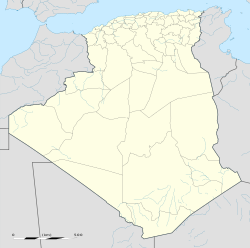Icosium
| Location | Algeria |
|---|---|
| Region | Algiers Province |
| Coordinates | 36°46′35″N 3°03′31″E / 36.7763°N 3.0585°E |
Icosium was a Phoenician, Berber and Roman city and bishopric (now a Latin titular see) in the casbah area of Algiers.
According to Greek myth, Icosium was founded by 20 companions of Hercules, the Greek name, Ικοσιον, being claimed to derive from εικοσι, the Greek word for twenty.
In fact, however, the settlement was occupied by Punic settlers from at least as early as the 3rd century BC. They called it Yksm, which is believed to have meant "seagull's island", and which was eventually transcribed as Icosium in Latin. The original Punic name is reflected in the modern Arabic name for Algiers (Arabic: الجزائر, pronounced Al Jaza'ir), which means "the islands".
Icosium remained a small trading post in the Phoenician and Carthaginian periods. In 146 BC, Icosium became part of the Roman Empire. The city was given Latin rights by Roman emperor Vespasian.
The bishops of Icosium are mentioned as late as the 5th century. It remained part of the Roman Empire until the 5th century AD, when it was conquered by Vandals.
The town was later reconquered by the Eastern Roman Empire (Byzantium) before the Arab conquest in the 7th century.
Circa 400 a Diocese of Icosium was established under Roman rule, which was suppressed circa 500, presumably by the Arian Vandals. Three Bishops are known from antiquity.
...
Wikipedia

